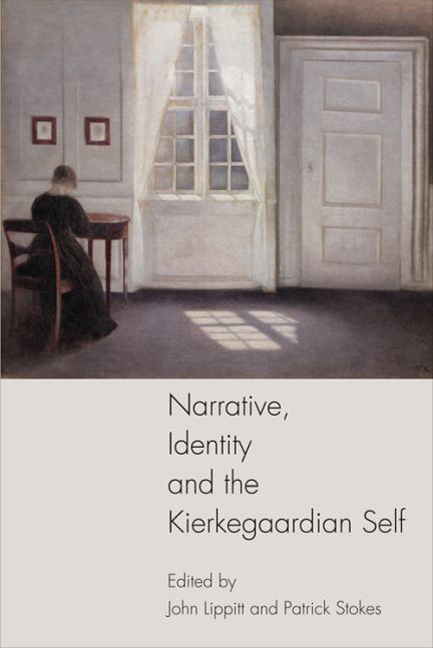Book contents
- Frontmatter
- Contents
- Acknowledgements
- Abbreviations
- Contributors
- Introduction
- 1 The Moments of a Life: On Some Similarities between Life and Literature
- 2 Teleology, Narrative and Death
- 3 Kierkegaard's Platonic Teleology
- 4 Narrative Holism and the Moment
- 5 Kierkegaard's Erotic Reduction and the Problem of Founding the Self
- 6 Narrativity and Normativity
- 7 The End in the Beginning: Eschatology in Kierkegaard's Literary Criticism
- 8 Forgiveness and the Rat Man: Kierkegaard, ‘Narrative Unity’ and ‘Wholeheartedness’ Revisited
- 9 The Virtues of Ambivalence: Wholeheartedness as Existential Telos and the Unwillable Completion of Narravives
- 10 Non-Narrative Protestant Goods: Protestant Ethics and Kierkegaardian Selfhood
- 11 Narrativity, Aspect and Selfhood
- 12 The Senses of an Ending
- 13 The End? Kierkegaard's Death and its Implications for Telling his Story
- Bibliography
- Index
13 - The End? Kierkegaard's Death and its Implications for Telling his Story
Published online by Cambridge University Press: 15 September 2017
- Frontmatter
- Contents
- Acknowledgements
- Abbreviations
- Contributors
- Introduction
- 1 The Moments of a Life: On Some Similarities between Life and Literature
- 2 Teleology, Narrative and Death
- 3 Kierkegaard's Platonic Teleology
- 4 Narrative Holism and the Moment
- 5 Kierkegaard's Erotic Reduction and the Problem of Founding the Self
- 6 Narrativity and Normativity
- 7 The End in the Beginning: Eschatology in Kierkegaard's Literary Criticism
- 8 Forgiveness and the Rat Man: Kierkegaard, ‘Narrative Unity’ and ‘Wholeheartedness’ Revisited
- 9 The Virtues of Ambivalence: Wholeheartedness as Existential Telos and the Unwillable Completion of Narravives
- 10 Non-Narrative Protestant Goods: Protestant Ethics and Kierkegaardian Selfhood
- 11 Narrativity, Aspect and Selfhood
- 12 The Senses of an Ending
- 13 The End? Kierkegaard's Death and its Implications for Telling his Story
- Bibliography
- Index
Summary
In Kierkegaard and the Quest for Unambiguous Life, I sought to read Kierkegaard in the particular context of modernist literature, politics, philosophy and religion that spanned the period from late romanticism through to existentialism. Inevitably, this is a categorisation that is difficult to define precisely, either historically or conceptually. Nevertheless, we can see many of the diverse movements and figures of the modernist breakthrough as sharing a concern to achieve a decisively unambiguous life, piercing through the superficial compromises of bourgeois society, looking reality in the face, and affirming the truth of iving personality. In this situation, values of honesty, authenticity and self-commitment come to the fore, and it is easy to see how Kierkegaard could be received both as a pioneer of the modernist tendency and also as a defining representative of its essential idea. Even if Georg Brandes and others complained of the pre-modern cocoon of religiosity in which his thought remained entangled, we have only to think of the early Kierkegaard's passionate search for ‘the Archimedean point’ that would bring unity to his scattered self – to find the idea for which he could live and die – or such Kierkegaardian tropes as either/or, ethical resoluteness, willing one thing, or ‘the moment of vision’. Whether or not these are separable from the religious context in which Kierkegaard himself developed them, it is easy to see how they point towards the secular quest for unambiguous life that we can discern in, for example, J. P. Jacobsen's Niles Lyhne, Ibsen's Hedda Gabler and Dr Stockmann, and on, in the twentieth century, to political decisionism and at least some versions of the culture of existential authenticity.
Even apart from the question as to the role of religion, this emphasis on the pursuit of an unambiguous life would nevertheless seem to offer less than the full truth regarding Kierkegaard. Don't many readers feel that Kierkegaard is at his best precisely when he appears before us as an exponent or else an analyst of irony, anxiety, humour, fear and trembling, silence and other ‘ambiguous’ conditions, that is, states of mind or forms of life of which the meaning or the truth do not lie on the surface, just waiting to be skimmed off, as it were, but which open up to reveal an inner infinity of potential meanings?
- Type
- Chapter
- Information
- Narrative, Identity and the Kierkegaardian Self , pp. 203 - 216Publisher: Edinburgh University PressPrint publication year: 2015

